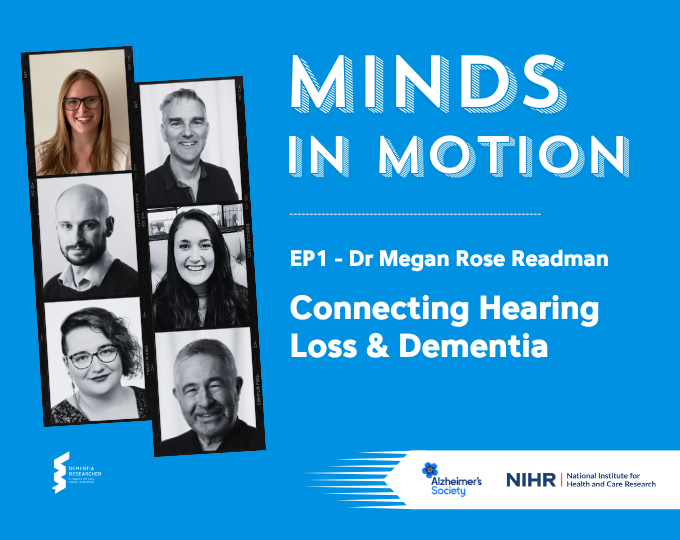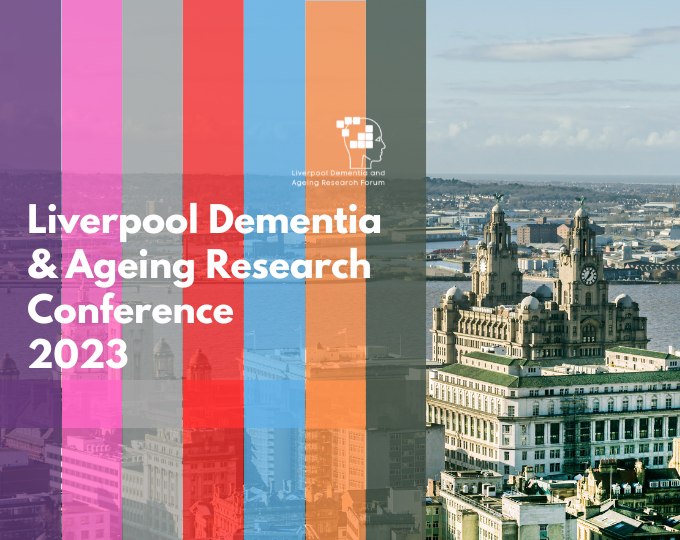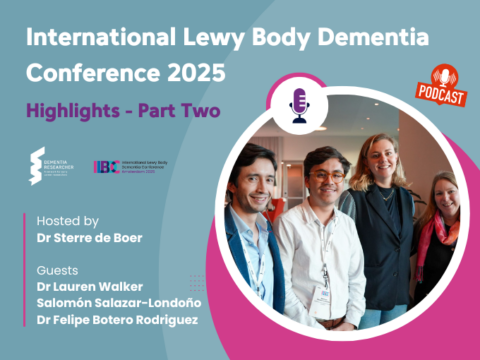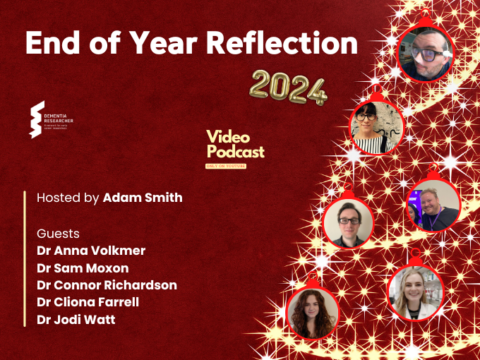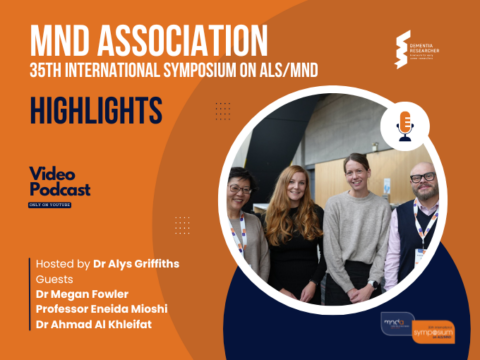The Minds in Motion Podcast from Dementia Researcher in association with the NIHR Applied Research Collaborations and Alzheimer’s Society, brings together NIHR Dem Comm Research Fellows, to talk about their research and careers.
In this first series, five of the Dem Comm Fellows each take a turn as co-host and guest. Alongside the researchers we have the incredible Trevor Salomon, Alzheimer’s Society Volunteer & Vice-Chairperson of the European Dementia Carers Working Group as our permanent co-host and anchor.
In this show Trevor is joined by Dr Megan Rose Readman from The University of Liverpool and NIHR Applied Research Collaboration (ARC) North West Coast to interview Dr Rasa Mikelytė.
Rasa works at the University of Kent and NIHR ARC Kent, Surrey & Sussex. Having previously specialised in end-of-life and social care, her research now focusses exploring integrated care pathways for people living with dementia. Joining up care leads to better outcomes for people. When local partners – the NHS, councils, voluntary sector, care homes and others – work together as integrated care, and we hear about this work.
Voice Over:
The Minds in Motion Podcast from Dementia Researcher in association with the NIHR Applied Research Collaborations and Alzheimer's Society highlighting exciting new research and the work of the Dem Comm fellows.
Dr Megan Rose Readman:
Hello and welcome to the second episode of Minds in Motion podcast from Dementia Researcher. Today, it's all about integrated care and the brilliant work of Dr Rasa Mikelyte. Hello, I'm Dr Meghan Rose Readman. I'm a Dem Comm research fellow in the NIHR Applied Research Collaboration on the northwest coast based at the University of Liverpool. In the last show, we heard about my research, which means it's my turn to take a turn as guest hosting alongside my incredible co-host Trevor Solomon.
Trever Salomon:
Thank you, Megan. I am Trevor Salomon. It says in my script I'm an Alzheimer's Society champion, but I'm not sure that champion is an official term that they use. So, I'm going to describe myself as an Alzheimer's Society volunteer. I use my voice for raising awareness of dementia and also particularly to talk about the challenges faced by carers like me. I'm also vice chair of the European Dementia Carers Working Group.
My passion and involvement are driven through the time I've spent as a full-time carer for my wife Yvonne, who was diagnosed with young onset Alzheimer's disease at the age of 57. Although she was exhibiting all the signs of it for the previous four years. She has been living in a care home for the last five years, I probably ought to say that too. Through this podcast series, we hear about some of the incredible research being delivered as part of the Dem Comm fellowship programme. This brilliant three-year partnership between the NIHR Applied Research Collaborations and the Alzheimer's Society promises to help deliver the next generation of future social science research leaders and explore a whole range of research areas which are often overlooked. But that's enough for the introductions, but let's get on with the show.
Dr Megan Rose Readman:
Hi, Rasa. Could I start by asking you to introduce yourself please?
Dr Rasa Mikelyte:
Hi, thank you very much for having me. I'm Rasa. I'm a researcher at Centre for Health Services Studies at the University of Kent and also a Dementia Research Fellow, or a Dem Comm fellow as we've been saying so far, with the Applied Research Collaboration for Kent, [inaudible 00:02:37] and Sussex. That's a mouthful and a half.
Trever Salomon:
And how long have you been doing this for, Rasa?
Dr Rasa Mikelyte:
Wow, that's a very good question because I've done dementia research in my undergrad. I've done it during my PhD, and I've been a jobbing researcher for seven years now or so. But there was a gap in the middle where I became employed as a researcher, but as I joke, a kind of gun for hire when you're junior enough and you work on other people's projects. So, I've got a gap of not doing anything dementia specific for quite a few years and these wonderful fellowships, that's my way back into dementia research.
Trever Salomon:
And can you tell us about your current research in particular, how the research landscape has changed over the last seven years?
Dr Rasa Mikelyte:
I think there's much more collaboration, much more doing things together, which is absolutely wonderful. At least that's what I've seen in the last couple of years. And I also went more from lone wolfing and doing research on my own to working as part of teams. So, I'm really excited about much more opportunities to work together both locally and nationally. I think that's a really wonderful change, particularly for early career researchers.
Trever Salomon:
And when you use the word collaboration, to what extent are you collaborating with people living with dementia and maybe their carers?
Dr Rasa Mikelyte:
I'd hope a lot. Now this slightly stands aside from my Dem Comm fellowship, but one of the really exciting things I'm doing at the moment is working with a group of people living with dementia to set research priorities in Kent. So, it very much focuses on people living with dementia, not for a moment suggesting that carer perspectives do not matter. They do very much, but this is really for elevating the voice of people living with dementia. And the exciting thing about that project is that what I was meant to do is find ways of doing priority setting work among people living with dementia, but kind of finding methodologies that fit and are dementia inclusive enough. I didn't, I couldn't, I agonised over it for a little while, reading literature thinking, "Am I missing a trick? Are my search strategies wrong? Why can't I not find an answer?"
And eventually a light bulb went on somewhere while working with people who are living with dementia of, "It's not my call, the method is not my call." So, I've been so lucky to be working with a smaller group of people living with dementia who have decided how we're going to do this work. And in mid-February, we're going to see if the method sticks. And if it's not as inclusive or as wonderful as we hoped it would be, at least it was generated from the ground up. So, it's a part of my work that I enjoy the most and working with people, doing research, not to people, but with people. It's kind of the joy of this for me at least.
Trever Salomon:
I'm thinking about my wife and her journey with dementia. You could have worked with her in the early stages of her dementia because she had capacity to respond to you and answer questions, but as her dementia progressed, she lost that capacity. So, my question to you is, to what extent are you working with people in the early stages of dementia?
Dr Rasa Mikelyte:
At the moment, the majority of work is involving people with early to moderate stages of dementia. In the past, particularly during my PhD, I won't advertise how many years ago that was, I did this kind of co-production work with people in advanced stages of dementia. And it's different work. It's not as neatly packaged or easy to achieve. And I guess what I found is two things.
One, it's definitely doable. So, my work back then was on improving mealtime experiences for people on continuing care wards. And I found that people could contribute to all sorts of ways so long as they were given an opportunity. And if the question by itself would not land, there were other ways to do so. I remember a conversation with someone with fairly advanced dementia turning more towards conversations about as if we were planning a dinner party together. And from that came a lot of what celebrating mealtimes was about for her.
Someone else who couldn't really engage verbally, and that is a challenge for researchers who rely on words a lot, was able to communicate during the kind of what I call observation times. And what I observed was the way this person was able to enjoy mealtimes much more when their spouse was there. And how much of a sort of gentle dance almost the mealtime became of sharing of both people giving each other food, for example, rather than a very unidirectional caregiver on the ward supporting the person. So, there are ways.
What I also saw, or rather I came at it really naive, I came thinking that if we generate ideas bottom up, if everyone on the wards, so people living with dementia, ward staff, and also family members, carers who come on the wards, if we all agree on what we want to see, then it can be done. And of course, the wider organisational structures often meant that it couldn't. So, I walked away feeling that A, doing things with people, doing research with rather than two people, even with advanced stages of dementia is very much possible. But is this creating false hope? And then not being able to deliver on it has been a not so positive angle of it. And I haven't squared up the circle yet. I haven't found the way through, but it's trickier, it's doable.
Trever Salomon:
Sorry, Megan.
Dr Megan Rose Readman:
That's all right.
Trever Salomon:
Do you mind if I ask Rasa another related question to her answer?
Dr Megan Rose Readman:
Please. Go for it.
Trever Salomon:
I'm very interested in your comment about how people with dementia seem to enjoy their mealtimes more if their spouse is there or maybe sometimes another family member. My wife's care in the care home where she's been for the last five years has been exemplary, I mean brilliant. They however ask that family members don't come in during mealtimes because it disrupts the flow of everything. It's okay if you want to take your meal in the room of your loved one but not in the main dining area. Is that something that you also observed or heard?
Dr Rasa Mikelyte:
Yes. So, what is generally termed as protected mealtime has been in place in both of my research sites. So, there were two different continuing care wards. Exactly the same organisational policy interpreted in completely different ways. So, in one of them it was exactly what you said, family members weren't welcome to be in communal spaces. It was often said, "Well it's great if your family member wants to see you, but it's everyone else's home too. What about them?" Or as you say, it disrupts the flow and routine. In the other one, the rule of protected simply meant this is the time for the mealtime. We can't go and do something else. But families were very much welcome into that space and supported to be there despite the exact same policy.
So, to some degree is how you colour within or outside the lines and how much people were able to challenge existing policies or how they interpreted them and also how confident staff were about those routines being observed sometimes by family members. But one thing that I think helped in or helped to appoint to gently challenge those processes is to say, but we do have parties and during party’s people eat just as much, just as well. And we do have families there. We do have all sorts of people. Someone is playing music in the corner.
So, we do have what is often termed as overstimulating content there, but it works out wonderfully because people are having fun. So that sometimes works, but I know that those policies can be an uphill struggle in my own observations, it doesn't seem to stack up. I've not witnessed another resident or patient become upset because someone else's family is there so long as it's a positive and fun space to be in.
Trever Salomon:
Yep, thank you.
Dr Megan Rose Readman:
So, I was just wondering, Rasa, when you were talking then you kept touching on doing research with people rather than two people and things like that. So, I was just wondering a little bit more about how you've involved the voice of people living with dementia and their carers in designing your studies and the multidisciplinary nature of your studies. I'm just wondering how that's playing out and any positives or anything like that.
Dr Rasa Mikelyte:
It really depends on different pieces of work and how much there's sort of give in the structures and systems to do so. So where can I try to involve people as early as possible? For example, recently we've submitted a grant application for research where the expert by experience team, a co-applicant team for the project involves a person living with dementia, a bereaved family care. It is a project on palliative care and the care worker. So, there we've been able to involve people quite early on in setting up the idea. This priority setting work that I spoke about earlier, that's going one step back that's saying I may have my research strengths and my interests, but should that determine what research happens or should people living with dementia determine what a priority is? And then we find researchers to plug those gaps and do that work. But what the priority is generated bottom up.
And then with other work, like what I'm doing for the Dem Comm fellowship, it's a bit less generated like that because I'm depending on a service evaluation of an existing service. And it is hard to say at this stage, at least I haven't been able to glean, how much the voices of people living with dementia and family carers have contributed to establishing the service. And also, the people that I will then be able to engage already depend on who are seen by the service. So, I try to flex this as much as possible. And I'm not for a moment suggesting that I've done a perfect job, that is never the case. But there's a lot of variability how much involvement there is.
Trever Salomon:
I want to ask you about integrated care. I know historically we've always relied on carers, so the human being to provide care in its widest form. My background is in international software marketing, and there's been a massive rise in technological innovation even in the, I say even in, but in the dementia space. And I wonder what you've been noticing and how you think that might affect integrated care going forward.
Dr Rasa Mikelyte:
Thank you. I wonder if my answer will be somewhat an unpopular one, but I think to some degree through research and in care service delivery, we tend to focus on the new shiny thing and there are loads of opportunities out there. So, I'm definitely not one to throw the baby out with the bath water. But the one digital shift we desperately need, have needed for as long as services have been out there and as long as we've been talking about integrated care, is integrated patient record systems. Wherever I turn, whatever I evaluate under integrated care umbrella, whatever services are involved, even if they're all healthcare services, there is a lot of red tape between people simply sharing records and ability to understand what's happening for a person who's being supported by multiple services at the same time and coordinate.
So, the very at the basic level, we need to get this right. And there's a lot of potential for other things for AI in service delivery. For a while we've spoken about robots delivering some of the care, and I am ambivalent about this, but it's definitely an opportunity out there. Virtual reality in provision of care has been more and more prominent in research and to some degree care delivery.
I think it's exciting, but I think sometimes we're we move our sites or focus to the new shiny thing because solving those really entrenched systemic difficulties like shared patient records is just one, not particularly sexy. Two, something that loads of people try to crack and we still don't seem to be able to. And three, just difficult.
Dr Megan Rose Readman:
I think that's so interesting, Rasa. And I think it's really interesting when you're reflecting on multi-morbidities and people who live with lots of different conditions because that is quite prevalent in the space that we're in in dementia. So, I was just kind of touching on that, would you say the lack of integrated healthcare records is one of the most significant challenges we face in implementing integrated care models or what challenges do you think are the most significant in this space?
Dr Rasa Mikelyte:
It's certainly a substantial challenge, but what cuts across everything is services that are resource strapped and chronically underfunded. And a lot of what we talk about integrated care as innovation or doing care better. And there is an angle of that of course, in how new initiatives are being set up, but a lot of the time the main imperative for integrated care is how to do more with less. Or actually how to do just the same with less, with the systems that we've got and with growing demand. So those main imperatives really play a role in how things are delivered.
And how do we really do integrated care when our systems are so non-integrated? When there is such a difference between how healthcare is delivered and funded and social care on the other side of that coin, it's always an uphill battle and no researcher can mobilise this degree of political will to do things this differently. So, I think myself included, we sometimes do research on the smaller stuff, not because we ignore the big stuff, but where we go without the big stuff is really tricky. Integrated care has been out there for a long time. Integrated dementia care has been researched quite extensively. We still haven't cracked it and I'm not sure that we ever will with without substantial reorganisation of the systems.
Dr Megan Rose Readman:
Really interesting. I was just wondering, Trevor, if what you were experiencing from your perspective with your wife, is it similar to what Rasa is saying?
Trever Salomon:
It is, and I absolutely support everything that Rasa said about we need to get the basics. The fundamentals have to be right, but technology and innovation is there to support the basics, not to replace them. And I have to give a plug at this time for the Longitude Prize on dementia, which you may know about, which is looking for a leading innovation to come through. It's fully funded project to help people with dementia live more independently for longer than they currently are. I chair the Lived Experience Advisory panel on that project and some of the stuff coming through is very exciting, but it's not a substitute for getting the basics. It never will be.
And when I said before that my wife's care in her care home has really been exemplary, it's because they do the basics well. Everything else will be icing on the cake when they could take advantage of technology that will help the carers, it may free up some time for them to do other things. And the point about robots that you made, Rasa, I know in Japan they are using robots in care homes. They're using them to hoist people in and out of baths and in and out of bed. Well, if the robots are doing it correctly, that's a safety issue as well. It's a benefit for everybody. But as I said, it's not a substitute for getting the basics right.
Dr Rasa Mikelyte:
Oh, absolutely. I couldn't agree more. And I think we've got some really exciting innovations coming, the cost element to it, particularly for social care settings. I think we'll introduce further inequalities between who can benefit from that top-notch care and who doesn't. But that's a separate kind of worms perhaps. And I'm definitely not anti-technology and not anti the wonderful things that technology innovation can bring to dementia care. I think these are very exciting times for it.
Trever Salomon:
Yeah, the downside, and that's probably not the right word, is that as care homes begin to invest in innovation, unfortunately it's reflected in care home fees, which are already a problem and just exacerbate and underscore the need for social care funding.
Dr Rasa Mikelyte:
Absolutely.
Trever Salomon:
So, we fix a problem, we create a problem. That's the issue that we have to deal with or one of the issues, I'm sure. And in your experience and from things that you've observed Rasa, are there any particularly poignant aspects of your research that you've hit upon or noticed?
Dr Rasa Mikelyte:
The Dem Comm fellowship research is not quite there where I get the poignant stuff out of it. I'm not collecting data yet, it turned out, so it might have to cut out my laughter 'cause I'm pre-laughing.
Sometimes you hit upon a knowledge gap, and you think, how has no one done this work before? And the answer is because it's an ethical nightmare, which I have insufficiently appreciated previously. So, I'm still going through the ethics processes and keeping my fingers crossed. So, I've got nothing from this project yet to share that is particularly poignant. I think the most important thing is, I guess how we assume who's got the answers. And it's very rarely researchers by themselves. It's very rarely service providers because they tend to have a lot of conflicting interests or pressures or imperatives and just how much potential there is involving experts by experience.
Because we sort of cracked this with chronic conditions where we appreciate that no one, no medical professional or social care professional will ever have as much knowledge as people who live with a condition all the time in their lives. And for that matter, they're family members who provide support. We sort of have started to trickle this through into dementia research and there are some wonderful examples out there, but I think the most important thing is spreading it wider, that becoming almost standard to how we do research is I think really exciting.
Dr Megan Rose Readman:
I was just wondering, Rasa, you've touched on loads of different things where different individuals could be involved and play a role or different professions could play a role. I was just kind of wondering the role of multidisciplinary collaboration in this area of research, is it quite important? Is it something you engage with a lot or not so much?
Dr Rasa Mikelyte:
Well, there is no integrated care without multidisciplinary collaboration, how well it happens. And it may be on principle, right? Maybe you could have, I don't know, nurses from very different institutions doing work together, which makes it non-multi dis- but even then. So integrated care is about more than that, but it's inevitably part of this.
So, I am looking at how it works, but I'm looking at it slightly differently. So, there's a lot of research out there that is evaluating initiatives, and a bit of this project is exactly that. It's looking at a crisis intervention team that is an integrated care initiative for dementia. But what it's doing is it's kind of weaving a web from the very centre that being the person living with dementia. And acknowledging that integration or integrated care is not just the formal initiatives of service X and service Y have joined forces and now they're doing it together or they've established a team who work together that can be one hell of a facilitator.
Understanding each other's eligibility barriers, other things working together rather than against each other, or at least rubbing shoulders is huge for delivering good care. But it's actually much more important for professionals themselves. It doesn't always trickle through, like trickle through economics or people don't necessarily always know when it worked and why should they? If it works, well, then you're not necessarily questioning how it is. But I'm going off on a tangent. What I'm looking at is formal as well as informal integration. So, from the perspective of a person living with dementia and their family carer, if there is one who are the main people, perhaps they are different professionals from that multidisciplinary team or integrated initiative. Maybe it's those people and a GP and a volunteer coordinator at a local singing group who calls and checks in once a week and someone else and the neighbour who cooks a meal.
So this web of how integrated care happens in reality and this coordination at the very frontline level, we know that you don't necessarily need formal integration for people to talk together when someone's experience of receiving support is that came to a revolving door and lots of different agencies come in, lots of different points of support are available. So how does it work? Then? We haven't particularly asked the question that way. So that's what I'm looking at. And it touches on multi-disciplinarity, but it's kind of more than that. And now I don't know if I've answered your question, Megan, so if I haven't, please, would you ask again?
Dr Megan Rose Readman:
Sounds great to me.
Trever Salomon:
Yeah. And I have to say as a carer, although I've handed over responsibility for day-to-day care, to a care home, ultimately, I am still my wife's primary carer. I'm heavily involved in her integrated care and sometimes I can help them when they're having challenges with her because nobody knows her better than I do. So, the carer is always going to be involved and never is going to abdicate that responsibility. We can't, I wouldn't dream of doing that. So, I absolutely buy into your answer, Rasa. There are a lot of people involved, but ultimately, particularly in a spouse situation, the spouse has a major role to play in their integrated care.
Dr Rasa Mikelyte:
Of course. As you say, it's anyone who knows the person. I think quite a bit of care home-based research in particular suggests that this may be, it's obviously a desired situation, but it doesn't work out the same way for all. So, some family carers feel that they're sidelined or their opinion, their expertise, their knowledge is no longer consulted. So, I'm really pleased to hear that that hasn't been your experience and that you've still been involved in providing as much support as you'd like to, but also having a chance to share that knowledge that no one else has.
Trever Salomon:
Yeah, to me it's an absolute imperative.
Dr Megan Rose Readman:
Brilliant. Okay. Thank you so much, Rasa. It was really great to hear about all your different research. So, in the next part of the podcast, we have some quick-fire career questions that we hope will help others thinking about working in this field and share some of what you have learned from across your career and throughout the Dem Comm programme.
Trever Salomon:
So, Rasa, are you ready? And remember, it's short answers only this time, please. So how do you stay focused and productive in a field that can be emotionally demanding?
Dr Rasa Mikelyte:
Okay, I hunt in a pack, so I've got excellent colleagues, many of whom I'm fortunate enough to call my friends and they keep me reasonably productive, although who doesn't have an occasional blip in productivity.
Dr Megan Rose Readman:
I love that answer. So, Rasa, how important has collaboration been in your career and do you have any tips for effective teamwork?
Dr Rasa Mikelyte:
Well, hugely, first of all, hugely, as I said, hunting a pack. It's easily in the top three of the favourite’s aspects of my job. And ask for tips. I guess if you can choose where you work, work somewhere where the culture of the organisation is supportive of collaboration, not of competition. And then check in often perspective, take even more frequently, just think of how others that you work with maybe feeling or thinking. And really good collaboration makes it all worth it. The long nights, the long evenings, everything.
Trever Salomon:
Yeah, I love that word, culture. When I chose my wife's care home, I chose it for a number of reasons. Obviously, good care and all the rest of it, but they saw my wife as an individual and person-centric care and that culture that says we look at your wife as somebody who has unique needs, even if many of them are common across the range of residents with dementia. Yeah, so I like that. So how do you keep your knowledge and skills up to date, Rasa, because things are now changing quite rapidly, I guess.
Dr Rasa Mikelyte:
They are, and I don't know how well I do this, but my main go-to now is networking. So, chances are other people will know much more than I do and will join the dots much quicker than I do if I'm looking at something new that I don't know much about. And dementia research field is massive. So, I think this fellowship has been very beneficial for this, as Megan will attest, sometimes if we have a question, we just ask a cohort of 50 plus, someone has the answer.
Dr Megan Rose Readman:
Yeah, definitely. It's super, super helpful. So, million-dollar question Rasa, how have you managed to maintain a healthy work-life balance?
Dr Rasa Mikelyte:
I haven't. That's the million-dollar answer, I haven't. There is nothing about my work-life balance that is healthy, but I'm a fan of burning the candle at both ends and I've told myself two things. It's a kind of rolling New Year's resolution. I do the first part really well. The second part is my learning process. So, first part is not to say no to social outings or being with people. And the second part that's not going so well is to say no more at work. We're getting there. Baby steps.
Trever Salomon:
If I could have my career all over again, that's one thing I'd really try and get right 'cause I failed miserably. Absolutely. What's the most important thing you've learned so far from the fellowship programme, Rasa?
Dr Rasa Mikelyte:
I guess how many ways there are to be a good researcher that there's not one trajectory or one timeline. I came with it feeling, "Oh my god, I've spent years doing other research that wasn't dementia focused. Does that mean the door is closed for me now or I'm automatically, I'm not going to catch up." And I've heard from so many people who have done things in so many different trajectories and it worked. If I become half as good at my job as some of those people, I know I've made it, I'll be okay.
Dr Megan Rose Readman:
We do have a really lovely group around us, don't we? Great group of people. So, my final question for you, Rasa, is what advice would you give to someone embarking on patient and public involvement for the first time?
Dr Rasa Mikelyte:
I'd say slow down, pace is everything. And sometimes in research, attention split from one thing to another. We're in a rush a lot of the time. So, it's just a space to take a step back and move at the pace of someone else and listen. And also, don't be afraid of disagreements. Good PPI work for me is one where you can have disagreements in a fairly safe space.
Dr Megan Rose Readman:
Definitely. I feel like I can learn an awful lot from you, Rasa. So just to switch things a little bit and change the perspective. So, some fun questions for you. If you could time travel to any period in history, when would you go to share your knowledge about dementia and why?
Dr Rasa Mikelyte:
Can I cop out of this one 'cause I think I'll be burnt at the stake. I think societies need to be ready to listen. So, I think I'm staying put because maybe just we're getting to that critical mass of voices that can make society as a whole lesson and any other time. Of course, not being clairvoyant, not knowing what the future looks like. I think it's the stake for me otherwise. So, I'm staying. Thank you.
Trever Salomon:
Do we allow that, Megan? Do we allow that cop out?
Dr Megan Rose Readman:
I think it was put quite nicely.
Trever Salomon:
I agree. I think we have to. I think we are charmed away through that combat, don't you?
Dr Rasa Mikelyte:
All talk, no trousers. That's me.
Trever Salomon:
So, here's another one for you, and let's see if you want to cop out of this one. If you could collaborate on your dementia research with any fictional character, who would it be and how do you think they would contribute?
Dr Rasa Mikelyte:
Oh, no. You see, I saw this question and my answer came quite quickly. It is just kind of not in line completely with the question yet again. So, I'm not choosing one. I'm choosing the whole village, if you will. I'm choosing the Moomin's and everyone who hangs out in the Moomin valley because when I read the question where my mind went was the last book, Moomin valley in November, where there's a lot of, there's themes of forgetting and remembering and trying to remember or trying to forget.
And I just think the whole vibe of the Moomin's is the absolutely right vibe to maybe challenge assumptions in society around dementia, narratives of loss and nothing left behind in inverted commas, but really embracing difference and the way people change. Which can be a sense of loss for the family member, of course it can be. But for society as a whole, that's an opportunity. So, I'm keeping the Moomin's and yeah, I can't choose one. I thought about this, but no, all of them.
Trever Salomon:
But before I hand over to Megan to close, I thought you might be interested to know. I put the question into ChatGPT. And it came up with Sherlock Holmes, Dr House, and Spock. And the rationale behind it was you need people with intelligence, empathy, and problem-solving skills. Interesting.
Dr Rasa Mikelyte:
Very interesting. I'm still sticking with the Moomin's.
Trever Salomon:
I think you should. Back to you, Megan.
Dr Megan Rose Readman:
I'm afraid to say, I hate to break it to you, Rasa. I have no idea who the Moomin's are, but your answer was fantastic.
Dr Rasa Mikelyte:
You'll have to look them up now. It's amazing. Read the books. There's the cartoon or several out there. Honestly, the Moomin's will change your life. And then go to Finland, get some Moomin blueberry coffee to just top off the experience and yeah, you're sorted. The philosophy of the Moomin's.
Dr Megan Rose Readman:
There you go. Unfortunately, I'm afraid. That's all we have time for today. If you just can't get enough of this topic, visit the Dementia Researcher website where you'll find a full transcript, biographies and blogs, and many more on this topic.
Trever Salomon:
I would like to thank our incredible guest, Dr Rasa Mikelyte. I'm Trevor Salomon.
Dr Megan Rose Readman:
And I'm Dr Megan Rose Readman and you've been listening to the Dementia Researcher podcast.
Trever Salomon:
Goodbye.
Dr Rasa Mikelyte:
Bye.
Dr Megan Rose Readman:
Bye.
Voice Over:
You've been listening to the Minds in Motion podcast from Dementia Researcher in association with the NIHR Applied Research Collaborations and Alzheimer's Society. To learn more about the Dem Comm programme and to get all the support you need, visit dementiaresearcher.nihr.ac.uk. And don't forget to like and subscribe.
END
Like what you hear? Please review, like, and share our podcast - and don't forget to subscribe to ensure you never miss an episode.
If you would like to share your own experiences or discuss your research in a blog or on a podcast, drop us a line to dementiaresearcher@ucl.ac.uk
Did you know... you can find our podcast in your favourite podcast app on mobile devices, and our narrated blogs are also available as a podcast.
This podcast is brought to you in association with the Alzheimer's Association, Alzheimer's Research UK, Race Against Dementia and Alzheimer's Society, who we thank for their ongoing support.
The views and opinions expressed by the host and guests in this podcast represent those of the guests and do not necessarily reflect those of UCL or Dementia Researcher

 Print This Post
Print This Post



